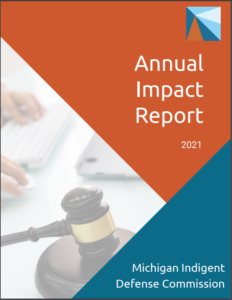October 28, 2021 – Today, Orlene Hawks, the Director of the Department of Licensing and Regulatory Affairs (LARA), signed the Indigency Standard proposed by the Michigan Indigent Defense Commission (MIDC). The Indigency Standard provides a framework for determining whether an individual qualifies for representation and other defense funding. It also provides guidance regarding the recoupment of defense costs from individuals with the ability to repay them.
Under current Michigan law, courts can assess defense costs without first considering the defendant’s foreseeable ability to pay. The Indigency Standard, however, instructs local court funding units not to seek reimbursement from indigent defendants.
“The Whitmer-Gilchrist administration is committed to ensuring everyone has full access to justice from our criminal legal system,” said Lieutenant Governor Garlin Gilchrist II. “Trying to collect defense costs from people who have no ability to pay creates more problems than it solves. The new standard is common sense and recognizes that money must not be a prerequisite for representation or justice. Just like our other reform initiatives, which include Clean Slate and the reforms proposed and enacted from the Joint Task Force on Jail and Pretrial Incarceration, this new MIDC standard will make Michigan’s justice system more equitable for everyone.”
In creating the Indigency Standard, the MIDC surveyed hundreds of defense attorneys, conducted focus groups with numerous judges and attorneys, and sought feedback from the State Bar of Michigan and the State Court Administrative Office. Input from these various stakeholders is reflected in the standard.
“The Indigency Standard promotes access to justice by looking at each person’s entire financial situation before determining their ability to pay attorney’s fees,”‘ said LARA Director, Orlene Hawks. “By carefully considering each person’s ability to pay, this standard compassionately balances the need for recouping costs with fundamental fairness.”
Once approved, local indigent defense systems have 180 days to submit a plan for compliance with the new minimum standard. Those plans and corresponding requests for funding are reviewed and must be approved by the MIDC.
After decades of being severely under-resourced, indigent defense in Michigan has seen significant improvements in recent years. Through the implementation of Minimum Standards 1 through 5, indigent defense attorneys statewide receive training annually, have access to experts and investigators as appropriate to provide constitutional representation, and enjoy the same independence from the judiciary afforded to prosecutors and retained counsel. In addition, defendants with insufficient means to hire an attorney now receive appointed counsel when they initially appear in court to face criminal charges.
Over 20 new public defender offices, including regional defender offices and approximately 50 managed assigned counsel systems have been established in Michigan since 2018. The evolution of local public defense systems across the state helps to ensure that those who cannot afford to hire an attorney have the same access to justice as those who can.
With this new standard, defendants are presumed to be indigent if they are receiving personal public assistance or earn an income less than 200% of the federal poverty guidelines. The standard also allows defendants to ask for re-screening at any time during the case due to a change in circumstances. According to Interim MIDC Chair Christine Green, “This flexibility is particularly important during a pandemic, and allows for these real-life circumstances to factor into the screening process.”
The mission of the MIDC is to develop and oversee the implementation, enforcement, and modification of minimum standards, rules, and procedures to ensure that indigent criminal defense services providing effective assistance of counsel are delivered to all indigent adults in Michigan. The MIDC is composed of eighteen members appointed by the Governor. The MIDC meets multiple times throughout the year to review and approve local systems’ plans for compliance with existing minimum standards and to create and implement standards for indigent defense delivery services. A full-time staff works in Lansing, Michigan. Standards 1 through 4 were approved by LARA on May 22, 2017, and Standard 5 was approved by LARA on October 29, 2020. A complete set of the MIDC’s Standards for Indigent Defense Delivery Systems can be found on our website.
Read the full press release here.



